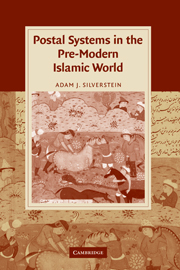Book contents
- Frontmatter
- Contents
- List of maps
- Acknowledgements
- List of abbreviations
- Introduction
- PART I THE PRE-ISLAMIC BACKGROUND
- PART II CONQUEST AND CENTRALISATION – THE ARABS
- 2 al-Barīd: the early Islamic postal system
- 3 Dīwān al-Barīd: the Middle Abbasid period
- PART III CONQUEST AND CENTRALISATION – THE MONGOLS
- Conclusions
- Appendix: distances and speeds of the Barīd
- Bibliography
- Index
- Cambridge Studies in Islamic Civilization
3 - Dīwān al-Barīd: the Middle Abbasid period
Published online by Cambridge University Press: 18 July 2009
- Frontmatter
- Contents
- List of maps
- Acknowledgements
- List of abbreviations
- Introduction
- PART I THE PRE-ISLAMIC BACKGROUND
- PART II CONQUEST AND CENTRALISATION – THE ARABS
- 2 al-Barīd: the early Islamic postal system
- 3 Dīwān al-Barīd: the Middle Abbasid period
- PART III CONQUEST AND CENTRALISATION – THE MONGOLS
- Conclusions
- Appendix: distances and speeds of the Barīd
- Bibliography
- Index
- Cambridge Studies in Islamic Civilization
Summary
Introduction
It would appear that al-Mutawakkil (r. 847–61) created the Dīwān al-Barīd, as he is the first caliph for whose reign both a Dīwān al-Barīd and a Ṣāḥib Dīwān al-Barīd are repeatedly mentioned in the Arabic sources. There is no direct evidence for the motivations behind the creation of such a dīwān in this period: the fact that al-Mutawakkil's concern for public security and justice was fabled amongst later writers, as was his willingness to expend large sums on the needs of the administration, are interesting but fall short of explaining why previous caliphs with similar reputations did not have a dīwān for the postal system. Be this as it may, it is probable that al-Mutawakkil himself was behind this initiative. Our sources describe him as a caliph who took an interest in the practical details of his realms. The same cannot be said for his predecessor, al-Wāthiq, who was sufficiently curious about the fantastical peoples of Gog and Magog and the legendary Seven Sleepers to send official delegations to locate the former and describe the latter, but was otherwise willing to perpetuate the policies and functionaries he inherited from al-Muʿtaṣim, and to defer to the wishes of such figures as the former mamlūk Ītākh and the qāḍī Aḥmad ibn Abī Duʾād. Al-Mutawakkil, on the other hand, dismissed both of these overbearing functionaries and wrote letters to the provinces instructing local officials to purge the administration of Christians and Jews, reflecting an active interest in the bureaucratic machinery of the empire.
- Type
- Chapter
- Information
- Postal Systems in the Pre-Modern Islamic World , pp. 90 - 140Publisher: Cambridge University PressPrint publication year: 2007

